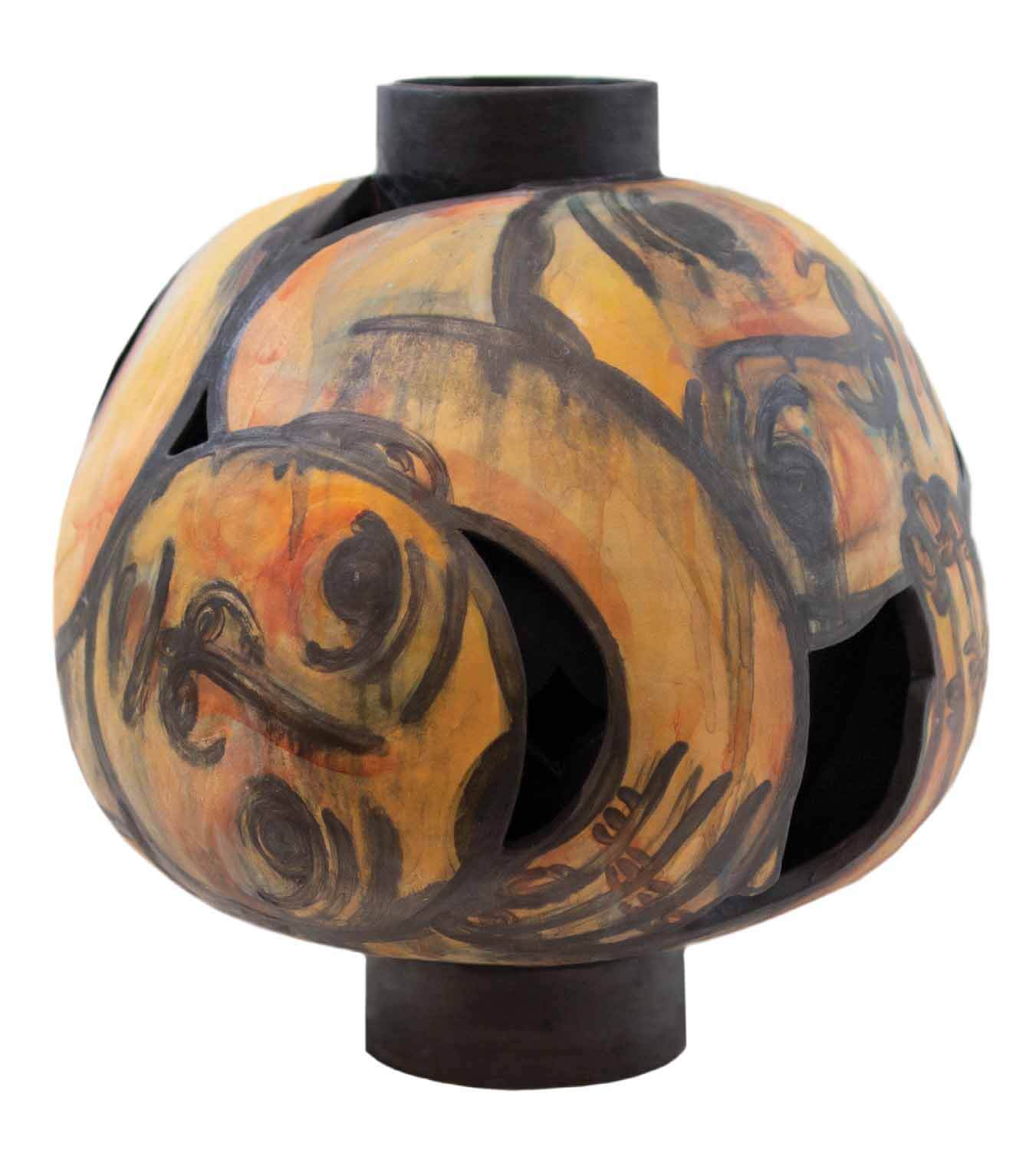
01 Aug Montana Artists in Residence
No distractions, no schedule, nobody barging into your space. That’s the beauty of an artist-in-residence program. Admittedly, it’s not for everybody, but those who do take a deep dive into creativity seldom regret it.
Across the state, programs vary in the amount of time, type of space, and number of residents. Here, we explore three Montana residencies that run the gamut.
Aunt Dofe’s Gallery
Aunt Dofe’s Gallery in the small town of Willow Creek started its residency program two years ago, but the gallery has always been a haven for artists.
Gallery owner Juni Clark is a big supporter of the arts. The residency offers a three-bedroom house separate from the gallery to artists or writers who would benefit from time and space — the biggest benefit a residency offers. “We bought the lot next door to the gallery and basically redid everything,” Clark says. “It took quite a bit of renovation. We had it rewired, replumbed, and repainted.”
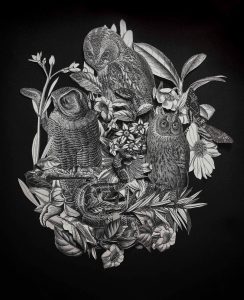
Owls of Athena | SHADOW BOX-ASSEMBLAGE COLLAGE | 12 X 12 INCHES | This hand-cut shadow box by Kate Huston was made during her residency at Basin’s Montana Artists Refuge, which culminated in a show at the end of her time there.
She also hung inspirational artwork all over the space and allows artists to use the rooms however they deem fit. “The light in the living area is really beautiful, and if someone wanted to, they could set up their studio there,” she says. “I don’t care how they use the space as long as they use it.”
The residencies range from one week to one year. There’s no stipend, but there is plenty of space, including two other metal buildings in the back where Clark is considering installing a kiln. At the end of the residency, Clark asks artists to show their work in the gallery space.
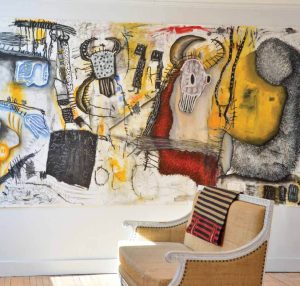
A Sean Chandler piece hangs in the primary artist residence in Willow Creek. The residency is part of Aunt Dofe’s Gallery, which is located next door. COURTESY OF AUNT DOFE’S GALLERY
Thomas Pomarico, who is now based in Flagstaff, was the first artist to live in the space before Clark renovated the house next door. He lived in the gallery (where an old meat locker houses a bedroom) and took full advantage of “being away from it all.”
“It can be disorienting to find yourself all alone in a small town like Willow Creek,” Pomarico says. “Depending on who you are, it can take a while to get to know your space and know your studio. There’s an acclimation period. Luckily, I was there for three months.”
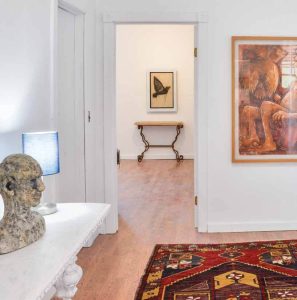
Looking in from the entrance at the residency in Willow Creek, the specially built home boasts art pieces in every room for inspiration. COURTESY OF AUNT DOFE’S GALLERY
After figuring out who was who — who was friendly and who would drop by (as folks do in a small town) — Pomarico got to know just about everyone in Willow Creek. “There was this one guy who chased me off,” he says. Pomarico was painting en plein air, and the nearby landowner wasn’t happy about it… at first. “Then, he came over to see what I was doing, and I ended up selling him three paintings.”
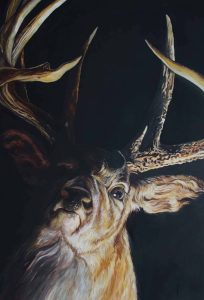
Dodge | OIL ON CANVAS | 74 X 50.5 INCHES | Thomas Pomarico’s painting, one of the first done at Aunt Dofe’s, makes use of shadow and light, and stems from the experience of almost hitting an elk on a Montana road.
Pomarico found just the right amount of synergy with other artists at the gallery. “They would look at the shows and look at my work,” he says. “I started interacting with people outside my usual circle, and I even connected with people in the film industry. It was a time when I was transitioning in a new direction, and it gave me time to resettle myself.”
Red Lodge Clay Center
Founder and executive director David Hiltner started Red Lodge Clay Center’s artist-in-residence program in 2006, offering various opportunities to ceramic artists just outside of Yellowstone National Park.
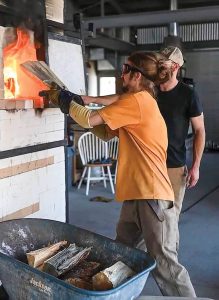
Short-term residents Jack Schwarze and Ben Blackwood stoke the main firebox of the train kiln at Red Lodge Clay Center. PHOTO BY KONSTANTIN REUTOV
“I started this with the mission statement for professionally minded artists to create new work and to share with our public the importance of having art in our everyday lives,” Hiltner says. “I wanted to create a place for people to land and create work right away.”
Hiltner offers an 8,000-square-foot studio space, housing, and a monthly stipend that’s based on the kind of residency. “Our long-term residency is a work exchange and includes fully furnished housing and a well-equipped studio, an $850 stipend per month, and a $1,200 materials budget. That helps them to open up and try new things,” Hiltner says. “We don’t ask anyone to work more than 80 hours a month, with one day a week in the gallery, a maintenance shift, fixing kilns, shoveling snow, and teaching community classes.”
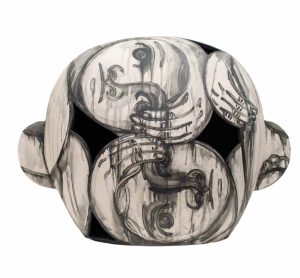
Everlasting | CERAMICS | 22 X 30 X 15 INCHES | Ceramic artist Soojin Choi experimented with black-and-white work during her time as a resident at the Red Lodge Clay Center.
In addition, by working in the gallery, artists learn the business side of their craft and the soft skills they need to cultivate in order to increase their likelihood of success. “We’re setting them up with a wide toolbox and skillset,” Hiltner says.
The short-term residency consists of three to five artists every four to six weeks. “It’s an opportunity to collaborate and build community,” says program coordinator Rachael Marne Jones. “It’s great to go to your studio and make work, but a group can really elevate the environment. They have the option to work independently, but many of the groups are interested in inter-artist dialogues.”
The longer one-year residency runs from September 1 to July 31, with the option to add a second year. The short-term residencies also begin in September, but finish up in mid-May; then, summer sessions begin and typically run for three weeks each.
“The shorter sessions are a bit different,” Jones says. “One artist will bring three to five other artists to work together. For that, we have a five-bedroom Victorian house, so each has their own bedroom. If accepted to the program, they live in that house for three weeks.”
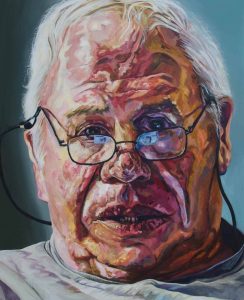
The Postmodern | Prometheus | OIL ON CANVAS | 76 X 61 INCHES | Thomas Pomarico’s The Postmodern Prometheus, a painting he worked on from time to time, was completed during his residency at Aunt Dofe’s.
The long-term residents do an exit show and resident exhibition. The short-termers are there to work on a special project.
Montana Artists Refuge
The Montana Artists Refuge (MAR) in the small mining town of Basin recently reinvented its artist-in-residence program. In 1993, the refuge was created as a nonprofit organization and, when the funding dried up in 2011, it disbanded. However, in 2022, a collective of artists that stayed in Basin decided to bring the residency program back.
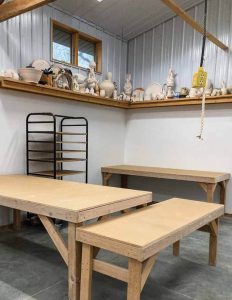
This communal studio space is offered to short-term residents at the Fox Studio at Red Lodge Clay Center. PHOTO BY RACHAEL MARNE JONES
Artists from around the world and 24 states have stayed at MAR since its reopening, including many from major cities like San Francisco and New York. “They have to be self-directed to be in Basin,” Herak says. “There’s not a formal program, and the nearest town is Boulder [population 1,200]. But it’s surrounded by beautiful mountains, perfect [for artists] to meditate, hike, or just take the time to think about their art.”
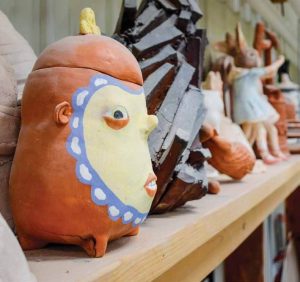
The long-term resident collection is housed above the long-term studio spaces in the Fox Studio at the Red Lodge Clay Center. Photo by RACHAEL MARNE JONES
Residencies usually last a month — anything less is highly discouraged — and include a furnished space with internet and a full kitchen.
Bozeman artist Kate Huston took up a residency at MAR last year and just got off another residency this year. “I love it,” she says. “It’s a great place to be creative.” The fact that this residency charges $1,000 per month didn’t put Huston off at all. “It is so worth it. I’m already saving up for my next one.”
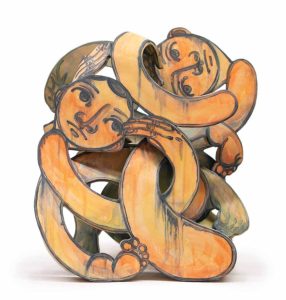
Double Bind | CERAMICS | 26 X 21 X 10 INCHES | Soojin Choi’s intertwining figural sculpture was completed during her residency at the Red Lodge Clay Center.
In the spirit of reciprocity, Herak says, “One of the things we ask of residents is to have an open house. Basin is a working-class community, and the art in Basin also benefits the community as a whole. We also ask the artists to give a talk and to show their work in the gallery.”
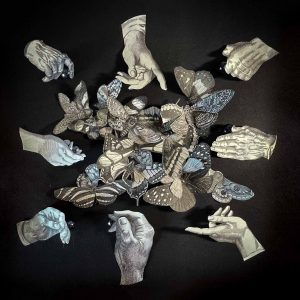
Synthesis | SHADOW BOX-ASSEMBLAGE COLLAGE | 12 X 12 INCHES | Montana Artists Refuge resident Kate Hudson collaged hand-cut paper images into a shadow box to create Synthesis.
To learn more about any of these artist-in-residence programs, visit their websites. There are quite a few other artist-in-residence programs around the state, including Open AIR, Yellowstone Art Museum, Artist Wilderness Connection at the Hockaday Museum of Art, Triple Creek Ranch, Absaroka-Beartooth Wilderness Foundation, Archie Bray Foundation for the Ceramic Arts, and Taft-Nicholson Center, as well as several throughout the region’s national parks.
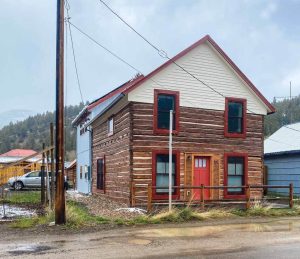
This modest residence is located in the small mining town of Basin at the Montana Artists Refuge. COURTESY OF MONTANA ARTISTS REFUGE
Freelance art writer, teaching professor, and author Michele Corriel earned her master’s degree in art history and her doctorate in American art. She has received a number of awards for her nonfiction, as well as her poetry. Her latest book, Montana Modernists: Shifting Perceptions of Western Art (Washington State University Press, 2022), won four awards, including a national award from the Western History Association.



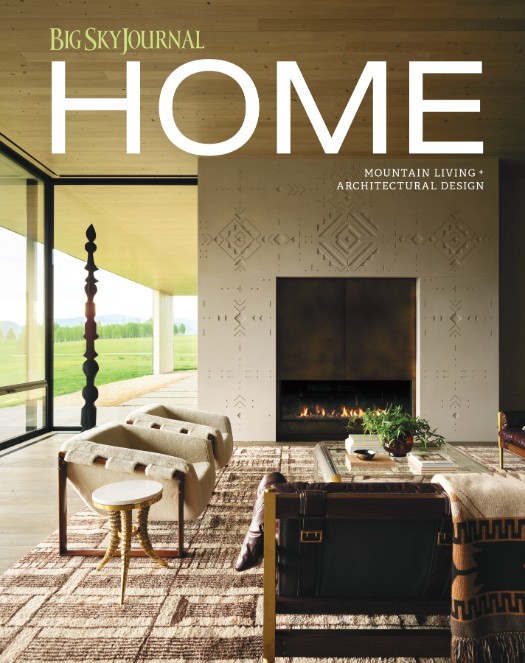
Alan Dinsfriend
Posted at 01:16h, 31 AugustI am interested in discovering emerging artists, regardless of the medium they may be working in.